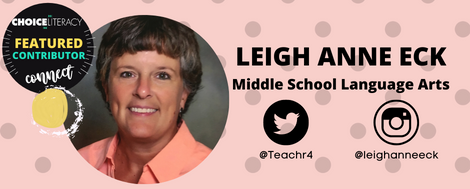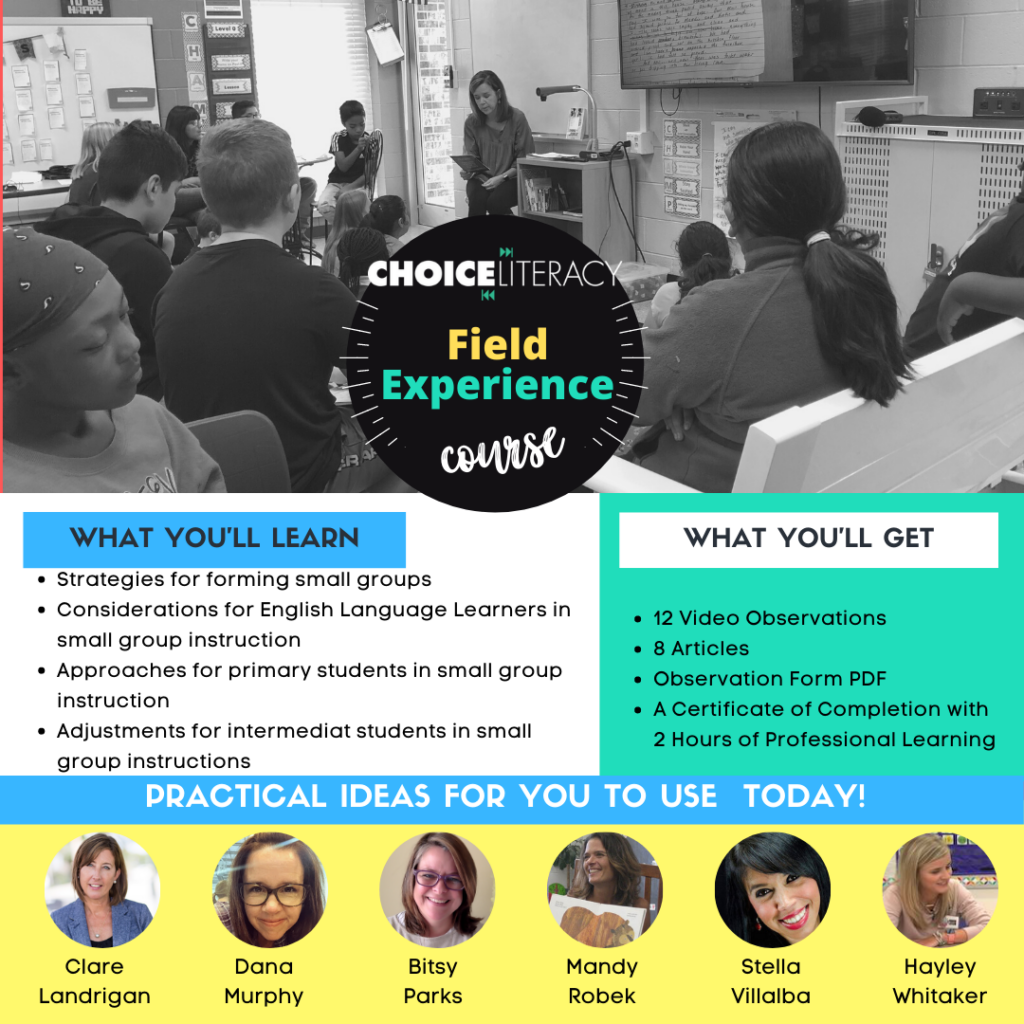A successful dinner is one that lasts awhile and one where everyone leaves happy. It’s a meal where we didn’t just wolf food down, rather something else happened at the table. That is the goal.
—Laurie David
[Now you can listen to the Big Fresh as a podcast.]
Come to the Table
It’s nearly dinnertime when the group begins to gather around the table. There are educators from several states in attendance. The group represents teachers from a variety of grade levels. In addition to classroom teachers, there are instructional coaches and administrators among the small group gathered to spend a few days writing.
For years, small groups of Choice Literacy contributors have gathered for a writing retreat. We pack our bags and our notebooks to spend time writing together. It’s a gift to have time to just focus on our writing for a bit. There’s no cooking, no cleaning, no laundry—just time to think and write.
As participants gather at the table, a familiar conversation begins. There’s always talk of position changes and family updates, but it moves quickly into the work we do in our spaces. Stories unfold of celebrations and challenges in the work we do as educators.
For me, gathering around the table is one of the highlights of the retreat each year. There’s something energizing about hearing the perspectives of different educators, hearing their stories, being taken into their classrooms for a bit to discover the magical spaces of their learning communities.
It’s one of the reasons I look forward to the Big Fresh each week. Reading each week’s collection of articles is always a bit like sitting around the table with this group. As contributors share their stories from the field with all of us, I momentarily step inside their classrooms, sit beside them as they talk with colleagues, see the way they puzzle over challenges and find their best next steps.
We know each of you are also passionate about the literacy work we do. We want to invite you to the table to share your stories. We have started a new feature each week on our Facebook page to hear from you. We hope you’ll take a seat at the table to share your stories, your challenges, your insights, and your celebrations. In our weekly Choice Chat conversations, we invite each of you to come to the table.
Pull up a chair and tell us your story.
This week we look at assessing readers—plus more, as always.
Shine on!
Cathy Mere
Cathy Mere runs the Choice Literacy social media feeds. She has taught grades K-6, and worked as a literacy coach and a Reading Recovery teacher in Ohio. Cathy is the author of More Than Guided Reading. She shares her professional reflections at Reflect and Refine: Building a Learning Community and dabbles in poetry and personal essay at Merely Day by Day. Cathy can be found @cathymere on Twitter.
This month’s featured contributor is Leigh Anne Eck. Leigh Anne teaches sixth grade at George Rogers Clark Middle School in Vincennes, Indiana. She is passionate about connecting her students with books and helping teachers believe they are writers. She shares her reading, writing, and teaching life on her blog A Day in the Life and on Twitter @Teachr4.

Join the Choice Literacy Book Club! Leigh Anne Eck selected the young adult novel Enduring Freedom by Jawad Arash and Trent Reedy as our October read. Grab a copy, and join the conversation using the hashtag #ChoiceLiteracyBookClub.
Ruth Ayres and Cathy Mere discuss this week’s theme, assessing readers, on the podcast.
Christy Rush-Levine considers how her rubrics do not acknowledge different levels of support some students need to accomplish tasks. She rethinks her rubric design to include support, and in the process fosters more independence and reflection in students. Download the assessment rubric. This article was first published in 2017.
Clare Landrigan and Tammy Mulligan explain how literacy coaches can validate and support teachers by helping them refine their classroom notetaking skills. This article was first published in 2012.
Don’t miss our Field Experience course about small-group instruction! Classroom observations are some of the most valuable learning experiences. Yet there is no way you can see everything when visiting a live classroom. Our Field Experience collection allows you to virtually discover diverse field experiences and see instructional strategies that pique your interest, as well as learn about the art of teaching. Free to members and available to purchase.

New members-only content is added each week to the Choice Literacy website. If you’re not yet a member, click here to explore membership options.
Gretchen Schroeder shares the way she adjusts her reading quizzes to assess students’ analysis and deep thinking about texts.
Matt Renwick reminds us that a lot of information is available in our classrooms that can inform instruction. Some of it—for example, reading logs—is “hiding in plain sight.”
In this video, Deb Gaby confers with Riley about The Lemonade War. They talk about the writing about reading students are doing for this whole-class read.
In this encore video, fifth grader Orion uses sticky notes to make questions and predictions at the end of each chapter.

Planning a professional learning session? PD2Go is the perfect place to start. Reading logs are a part of many classrooms. This session carves out space for teachers to consider the purpose of reading logs. Clare Landrigan makes the comparison between reading logs and running logs in a demonstration lesson. A choice of articles is given for participants to think more deeply about the purpose of reading logs.
Don’t forget our downloads! Cathy Mere explains why it’s important as a reading support teacher to avoid assessments in the first days of school, and instead focus on getting into classrooms to observe and share resources. Download the initial questions to ask readers to take along with you to first reading conferences.
Deep Dive course: Meaningful Reading Conferences. If you are leading teachers in conferring with readers, don’t miss Christy Rush-Levine‘s Deep Dive course, Meaningful Reading Conferences. Christy takes you into her middle school classroom and shares the strategies and techniques she uses with her students to deepen their reflection and understanding of books while conferring. Free to members and available to purchase.
Quote It:
We now accept the fact that learning is a lifelong process of keeping abreast of change. And the most pressing task is to teach people how to learn.
—Peter Drucker
That’s all for this week!






